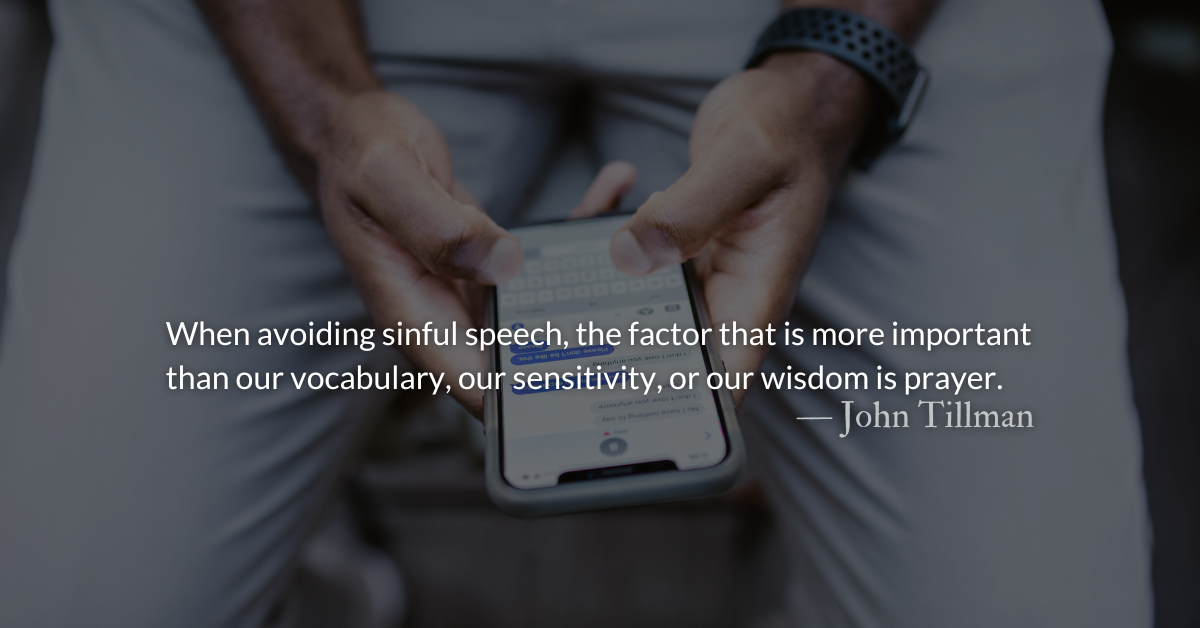Scripture Focus: Psalm 39.1-3
1 I said, “I will watch my ways
and keep my tongue from sin;
I will put a muzzle on my mouth
while in the presence of the wicked.”
2 So I remained utterly silent,
not even saying anything good.
But my anguish increased;
3 my heart grew hot within me.
While I meditated, the fire burned;
then I spoke with my tongue:
Reflection: Tongues, Thumbs, and Prayers
By John Tillman
The psalmist, presumably David, suffers in silence. He muzzles himself, not even saying good things because of the wicked. Silence increases his anguish. Inner turmoil heats up. He turns to meditation, but heat becomes a burning flame. So, he opens his mouth to speak…
If we stopped at verse three, we might assume the psalmist’s unsheathed speech became a sword, fighting for God. We might think his words laid waste to the wicked. We might imagine ourselves following the psalmist’s example by opening a social media app and delivering a diatribe of harsh truths to destroy ideological opponents. We’d be wrong.
The psalmist spoke to God, not humans. He had questions, not claims. He sought truth. He didn’t weaponize it. His faith was mixed with doubts. His courage was mixed with fears. His prayers were mixed with weeping.
Don’t forget the first verse of this psalm: “I will…keep my tongue from sin.” The Bible repeatedly warns us of sinning by speech. If James had seen us on mobile devices typing in our social media apps, he might have written “thumbs are a restless evil” instead of “tongues.” (James 3.17)
Should we—can we—use our tongues to speak or our thumbs to type without falling into sin?
Do we need better vocabulary? Surely if we eschew harsh, foul, or insulting language, our speech can’t be sinful? No.
Do we need to be less dogmatic? Surely we can avoid sin by placating both sides and avoiding hard stances? No.
Do we need greater intellect? Surely intellectualism, facts, and data can keep us from sinning by speech? No.
It is not our tongues or our thumbs that cause us to sin. It is our hearts. (Matthew 12.34; Luke 6.45) A better vocabulary won’t heal our hateful hearts. A more understanding tone won’t calm our heart’s fear of confrontation. The brightest of intellects can’t enlighten the sin-darkened pathways of our hearts.
When avoiding sinful speech, the factor that is more important than our vocabulary, our sensitivity, or our wisdom is prayer. Our prayer life changes our hearts.
The psalmist is brutally honest with God. Are your prayers honest?
The psalmist seeks forgiveness and help. Are you confessing and requesting?
There is a time to speak up, testify to the truth, and defend what we believe. When that time comes, will our prayer life have prepared us to speak?
Divine Hours Prayer: The request for Presence
O Lord, my God, my Savior, by day and night, I cry to you. Let my prayer enter into your presence. — Psalm 88.1-2
– From The Divine Hours: Prayers for Summertime by Phyllis Tickle.
Today’s Readings
1 Kings 19 (Listen 3:53)
Psalms 39 (Listen 1:49)
Read more about Prayer When None Are Faithful
We are dismayed, Lord…
We are sheep among wicked shepherds…
Will only braggarts lead?
Will only the boastful hold sway?
Read more about Cultivation Requires Planning
For a mustard seed faith to grow, it must be cultivated. Do you have a plan to cultivate your spiritual growth?








